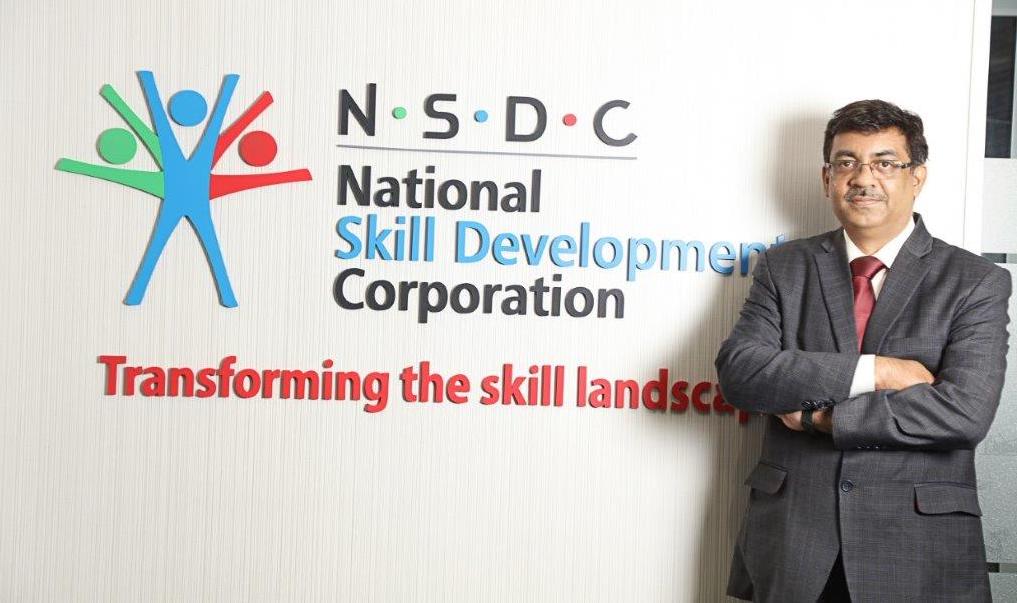 “Extensive advocacy, proactive industry engagement and adherence to quality are crucial in making skills aspirational.” Dr. Manish Kumar, CEO, NSDC
“Extensive advocacy, proactive industry engagement and adherence to quality are crucial in making skills aspirational.” Dr. Manish Kumar, CEO, NSDC
As India’s premier organization to catalyse, calibrate and support the skilling ecosystem, NSDC has been in the forefront of many partnerships and programs that brings together many stakeholders, working closely with the Ministry of Skill Development and Entrepreneurship (MSDE).
We at NSN, are more than delighted to present this exclusive Skill Talk with Dr Manish Kumar, CEO, NSDC, on understanding various initiatives and interventions from National Skill Development Corporation (NSDC). Let’s read on to learn more about how extensive advocacy, proactive industry engagement and adherence to quality are crucial in making skills aspirational.
Q: How is NSDC driving the message “skills are not just for dropouts and low-performers but are required by all, as they enable one to be part of the workforce and remain employable”?
A: This has always been a priority area for NSDC. We have several advanced courses such as Instrumentation and Calibration for more high-skilled individuals. Other examples include PLC Programming and Designing. Interestingly, in WorldSkills Kazan 2019, India won a gold medal in the niche field of Water Technology, with other laurels in Web Technologies, Graphics and Jewellery design.
This assumes greater importance with the changing nature of work and technology. Recently, through a platform called FutureSkills we engaged with industry to drive reskilling and upskilling initiatives aimed at preparing their workforce for new technologies and the future of work. FutureSkills is a service platform that aggregates training programs from premium providers like Udemy, EdX, Microsoft etc. to cater to the skill development, re-skilling, and upskilling needs of employees. It focuses on building 155+ skills for 70+ jobs in 10 emerging technologies and 10 professionals/transversal skills.
Further, we are forging other partnerships with academic institutions and industry to not only align skill training with the demands of emerging technologies but also to introduce the use of Augmented Reality (AR)/ Virtual Reality (VR) in skills delivery. Veative, one of our partners, teaches how to operate, say, an oil rig, using VR.
Q: How does NDSC ensure quality outcomes and sustainable placements from affiliated training partners – both funded and non-funded?
A: Quality outcomes in terms of candidate training and improved employability are one of the most important criteria for NSDC – affiliated training partners. NSDC – affiliated training partners under the market-led program have the requisite infrastructure with best-in-class lab facilities for offering both short and long duration courses. Both funded and non-funded partners have extensive industry connect to ensure that their trainees are employed post program completion.
The infrastructure and training delivery mechanism is monitored at regular intervals by the NSDC monitoring team. Through a call validation exercise, NSDC assesses partners on multiple parameters, including the sector, course and placement status of trainees uploaded on the Skill India Portal. Additionally, necessary feedback is recorded from each trainee on training delivery, quality of trainers and placement support. Partners are also encouraged to take feedback from employers, and this is checked by NSDC at the time of inspection.
Training partners are also encouraged and supported as and when required in the use of technology platforms for measuring and tracking the trainee life cycle right from enrollment and successful completion of training to placement and retention in the job.
 Q: Talking about advocacy and counselling, could you share your views on initiatives like Skill Saathi that helped in creating awareness about the reality of job markets, bridging student/parent expectations, and controlling attrition?
Q: Talking about advocacy and counselling, could you share your views on initiatives like Skill Saathi that helped in creating awareness about the reality of job markets, bridging student/parent expectations, and controlling attrition?
A: Information asymmetry continues to be one of our biggest challenges. Often, we find that there is a mismatch in salary expectations and a lack of understanding of the nature of work in different industries. A young construction worker may enter the workforce at a monthly wage of Rs. 8,000-10,000, but expect receiving a salary of Rs. 18,000. In retail, many individuals drop out for the simple reason that they do not expect to be standing on the shop floor through the day. Counselling can go a long way in bridging this asymmetry and controlling attrition. Skill Saathi provided crucial information on available courses and market opportunities, using psychometric testing and counselling interventions. In the coming year, we wish to introduce tech- enabled counselling mechanisms, in addition to face to face interventions in schools and training centers.
Q: Kindly share your views on making skills aspirational for all stakeholders – industry, academia, students and parents, so that more and more youth opt for skill-based courses?
A: We have been working in about over 10,000 schools, impacting about 10,00,000 students and their parents. The idea behind this is to integrate schooling and skills and drive up the aspirational value of vocational careers at an early age. It is imperative that we bring about a change in the way children perceive different vocations. For instance, underwater welding is one of the highest paid jobs in the world, yet welding has limited aspirational value.
Extensive advocacy is required to not only increase awareness among students and parents, but also improve wages and employment conditions. In an impact evaluation study of PMKVY, we found that trained and certified individuals were 1.8 times more likely to get employed compared to their peers. Additionally, their average monthly income level was found to be 15% higher, with only a few months of training. The dissemination of this information through different mediums will play an important role in driving up the aspirational value of skills.
Q: As we are aware, NSDC has also conducted many sensitization workshops for promoting NAPS among industry members. Is there a plan to seek proactive industry engagement, particularly MSMEs?
A: We are proactively seeking industry engagement through our partners. Initially, large organizations who have been sensitized to the apprenticeship program and who understand its intrinsic value will be brought on board. As numbers increase, it that expected that smaller MSME companies in the large organizations’ sectors will slowly start engaging apprentices as well. To achieve this, we will work closely with the Governing Council members of the Sector Skill Councils, who will act as front runners in the adoption of the apprenticeship program in their respective sectors.
Additionally, we are working with the Economic Times – India Leadership Council that comprises the top management of leading corporates. This engagement is aimed at creating ‘Champions of Apprenticeship’ who will increase awareness and adoption in their respective professional networks. We are also providing extensive handholding support to Third Party Aggregators (TPA) and are helping them partner with employers. Lastly, the TPA and SSC incentive scheme that was recently announced, is designed in a way to increase the onboarding of MSMEs and new companies (who were previously not taking apprentices).
Q: Please let us know more about the TITP and other international skilling programs for demand-driven courses that can leverage India’s demographic dividend.
A: The governments of India and Japan are cooperating to implement Japan’s Technical Intern Training Programme (TITP), an on-the-job training scheme providing three to five years of internship opportunities for foreign nationals in Japan, with NSDC as the implementing organization. Currently, there are 29 empaneled Indian Sending Organizations and 181 interns pursuing Technical Intern Training in Japan in diverse sectors such as Manufacturing, Construction, Agriculture and Healthcare. In the coming year, NSDC will explore the high-skilled segment for Indo-Japan migration outside of the TITP.
Further, MSDE and NSDC have entered into partnerships with countries like the UAE and Saudi Arabia for skill harmonization and benchmarking to promote the mobility of certified workers through policy interventions including financial incentives on work permits. In the first phase 13 Qualifications have been benchmarked with UAE and 5 Qualifications with Saudi Arabia. Conversations with agencies in Far East Russia, Sweden, Finland, Denmark and Quebec to explore partnerships for workforce mobility are ongoing.
NSDC has also operationalized the India International Skill Centre (IISC) Network to facilitate overseas workforce mobility. IISC Network members work on the entire value chain from counseling and guidance, to skill testing, incremental training, and overseas placement.
Q: How is NSDC partnering MHRD for Degree courses like B.Voc. that are bringing industry and academia closer?
A: In India, university curriculums tend to be very theoretical with minimal emphasis on industry relevant skills. As a result, when organizations recruit fresh graduates, considerable time and resources are invested in on-job training. NSDC is working on different initiatives to bridge this gap. The B.Voc. course is currently running in 531 colleges. We are aligning these courses to the National Skill Qualification Framework. We have introduced Degree Apprenticeship – degree courses with an embedded apprenticeship component, through which students undergo training on the industry shop floor while pursuing their degrees. Further, we are working on facilitating apprenticeship for exiting graduates.













I am Textile graduate and also Assessor under NSDC.